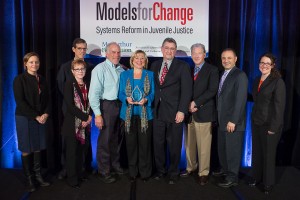
From left to right: Cecely Reardon, Attorney in Charge, Youth Advocacy Division; State Senator Will Brownsberger; Hon. Paula Carey, Chief Justice of the Trial Court; Joel Loitherstein; State Senator Karen Spilka; Ed Kelley, President and CEO, Robert F. Kennedy Children’s Action Corps; Tom Grisso, Director of Psychiatry and Director of the Law-Psychiatry Program, University of Massachusetts Medical School; Anthony Benedetti, Chief Counsel, Committee for Public Counsel Services; Naoka Carey, Executive Director, Citizens for Juvenile Justice.
FRAMINGHAM, MA – State Senator Karen Spilka has been named a Champion for Change in juvenile justice reform by the John D. and Catherine T. MacArthur Foundation’s Models for Change initiative. She was recognized at the 8th annual Models for Change national conference on Monday, December 16th, 2013 in Washington, D.C. for her leadership on a broad range of juvenile justice reforms in Massachusetts.
The Models for Change Executive Committee selected Senator Spilka from 16 nominees from across the country in the Champion for Change in State Leadership category. Senator Spilka was nominated for the award by a group of Massachusetts advocates, researchers and organizations representing a wide array of stakeholders in the juvenile justice system. In nominating Senator Spilka, they praised her willingness to take on controversial issues to significantly improve the lives of children and families and her ability to work collaboratively with other elected officials and stakeholders.
“We join together because we think Senator Spilka’s extraordinary leadership on a broad array of progressive juvenile justice reforms in Massachusetts has resulted in demonstrable and meaningful impact on the lives of children and families across the Commonwealth, and because she serves as a model to others on how to build consensus and support for these issues,” the nominating organizations and individuals wrote.
“Senator Spilka stands out for both her approach and her effectiveness. In our eyes, she would be a champion just for having the heart, vision and courage to take on these issues and for seeing the societal value of promoting a fairer, more developmentally appropriate, and more effective juvenile justice system. But, in fact, she is astoundingly effective and she has taken us from dreaming about a better juvenile justice system to experiencing massive improvements.”
Senator Spilka’s nomination was based on four specific examples of her leadership in progressive juvenile justice reform in Massachusetts over the past several years:
- Raise the Age: This year, both branches of the Legislature passed legislation, subsequently signed into law by Governor Patrick in September, to raise the age of juvenile jurisdiction by one year, bringing 17-year-olds into the juvenile justice court and support services system. Raising the age of juvenile jurisdiction acknowledges the unique developmental needs of teenagers and will give many young offenders the chance to receive the support services they need to get back on track and succeed in the future.
- Child in Need of Services (CHINS) Reform: In 2012, the Legislature completely overhauled the CHINS system, which handles children who consistently get in trouble at home or at school, including runaways and students who are habitually truant. Senator Spilka worked to create a statewide network of community resource centers for families seeking assistance, significantly reforming the previous court-based system. These family resource centers are now in the process of identifying the specific behavioral, preventative and educational resources and services that they will provide for communities.
- Juvenile Sentencing Reform: This session, the Legislature is considering important reforms to juvenile sentencing options in Massachusetts and Life Without Parole sentences for young offenders. These changes take into account the developmental differences between youth and adults and young people’s capacity to change and grow.
- Juvenile Indigent Defense Action Network: Senator Spilka has been actively involved in the Models for Change initiative’s reform efforts in Massachusetts, including the program’s Juvenile Indigent Defense Action Network. The team works to develop fair, effective divisions of juvenile defense and juvenile advocacy in the state’s public defender agency.
“I am so honored to be recognized by the MacArthur Foundation and the Models for Change coalition,” Senator Spilka said. “There’s always more we can do to better serve our children here in Massachusetts, and nationwide, but I hope that these important reforms will make positive differences in the lives of our children, families, friends and communities. I’m grateful for the support of the Models for Change network and my colleagues in the legislature that helped make such critical changes possible.”
The Models for Change initiative is a John D. and Catherine T. MacArthur Foundation national effort to reform juvenile justice systems across the country to make them more effective, fair, rational and developmentally appropriate. The annual conference brings together nearly 400 state and local officials, advocates and community organizations to network, share information and learn from leaders in juvenile justice reform efforts. Each year at the conference, the MacArthur Foundation and the Coalition for Juvenile Justice honor Champions for Change, individuals who are responsible for promoting progress in juvenile justice systems and are positively impacting the lives of court-involved youth, their families and communities. These leaders act to create pathways from delinquency and re-offending that increase the potential of young people to succeed in school and in family, peer and community relationships.
###
